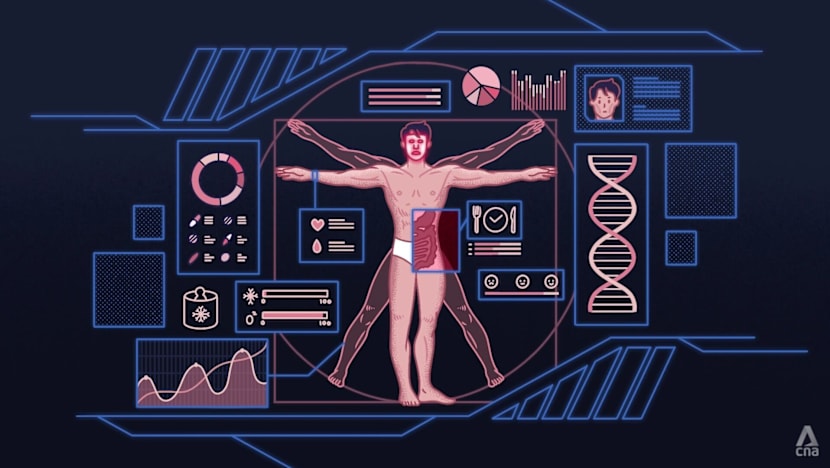Health
Biohacking: Entrepreneurs Seek to Optimize Health and Longevity

A growing number of individuals are embracing biohacking—an experimental approach to health and longevity that combines lifestyle changes with technology. Among them is 43-year-old entrepreneur Nicholas Lin, who meticulously curates his daily routine to optimize his physical and mental performance. His regimen includes seven hours of sleep, a daily intake of 34 supplements, and a diet focused on high-protein meals. The meticulousness of his approach is evident as he logs every detail in a comprehensive 10-page document.
Lin’s commitment to self-optimization stems from a desire to maintain the vitality he experienced in his 20s. “I thought about what my mental and cognitive peak of my life was, and I figured that was around 26 or 27 years old,” he explained. Over the past 13 years, he has refined his practices, which include an exercise routine and regular use of equipment designed for cellular rejuvenation.
Another biohacker, Vignesa Moorthy, 52, began his journey after his mother’s cancer diagnosis in 2019. He transformed his lifestyle by eliminating alcohol and cigarettes, prioritizing sleep, and incorporating daily exercise. Moorthy has invested approximately S$50,000 (around US$38,500) annually in biohacking, which includes personal interventions like water fasting and the use of a hyperbaric oxygen chamber at home. His goal is to achieve the best quality of life as he ages.
For Professor Dean Ho, director of the Institute for Digital Medicine at the National University of Singapore, biohacking began with a simple blood testing kit he purchased in 2021. This sparked a series of lifestyle changes, including extended fasting and daily exercise. Ho has since become the sole test subject in a study called “Delta,” which aims to map individual health trajectories and develop a personalized healthcare approach.
The biohacking community is diverse, with members adopting various methods to enhance health and performance. Some focus on lifestyle adjustments—like dietary changes and exercise—while others utilize technology for treatments such as red light therapy and hyperbaric oxygen therapy. This movement merges scientific research with self-optimization, appealing to those eager to take control of their health.
While biohacking has gained traction, experts caution against the potential risks associated with unproven interventions. Dr. Laureen Wang, head of the Healthy Longevity Research Clinic at Alexandra Hospital, notes that many biohacking practices lack robust evidence and can involve untested therapies. She emphasizes the importance of rigorous human trials to validate interventions before they are widely adopted.
Concerns about the safety of certain supplements and practices are prevalent. Professor Wang Yibin from Duke-NUS Medical School warns that findings from animal studies may not translate effectively to humans, emphasizing the need for well-designed clinical studies. The biohacking community itself often advises caution, with individuals like Lin avoiding overly strict schedules to prevent anxiety related to tracking their health metrics.
Ultimately, the principles of biohacking resonate with the broader pursuit of health. “Over time, I realized that much of what we attempt to fix through biohacking can simply be avoided by making better decisions in the first place,” Lin reflected. The consensus among biohackers and health experts alike is that foundational practices—adequate sleep, balanced nutrition, and exercise—are critical to achieving longevity and quality of life.
The movement continues to evolve, drawing interest from affluent individuals keen on maximizing their healthspan. With ongoing advancements in technology and research, biohacking may redefine how the world approaches personal health, but its most effective strategies remain grounded in well-established principles of wellness.
-

 World5 months ago
World5 months agoSouth Korea’s Foreign Minister Cho Hyun to Visit China This Week
-

 Business5 months ago
Business5 months agoStarling Bank Plans Secondary Share Sale, Targeting $5.4 Billion Valuation
-

 Top Stories5 months ago
Top Stories5 months agoMunsang College Celebrates 100 Years with Grand Ceremony
-

 World5 months ago
World5 months agoPAS Aims to Expand Parliamentary Influence in Upcoming Election
-

 Business7 months ago
Business7 months agoKenvue Dismisses CEO Thibaut Mongon as Strategic Review Advances
-

 Lifestyle6 months ago
Lifestyle6 months agoHumanism Camp Engages 250 Youths in Summer Fest 2025
-

 Sports6 months ago
Sports6 months agoDe Minaur Triumphs at Washington Open After Thrilling Comeback
-

 Sports7 months ago
Sports7 months agoTupou and Daugunu Join First Nations Squad for Lions Clash
-

 Top Stories7 months ago
Top Stories7 months agoColombian Senator Miguel Uribe Shows Signs of Recovery After Attack
-

 World7 months ago
World7 months agoASEAN Gears Up for Historic Joint Meeting of Foreign and Economic Ministers
-

 Health6 months ago
Health6 months agoNew Study Challenges Assumptions About Aging and Inflammation
-

 Business7 months ago
Business7 months agoOil Prices Surge Following New EU Sanctions on Russia









